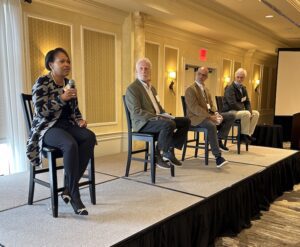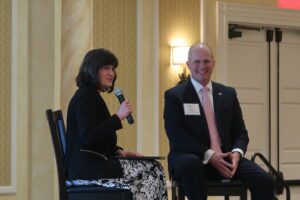Who is a member?
Our members are the local governments of Massachusetts and their elected and appointed leadership.

Several veteran select board members share their local government experiences and insights during the MMA’s June 9 training for newly elected select board members in Devens. Pictured are (l-r) Debra Roberts of Stoughton, Irwin Nesoff of Hull, Peter Spellios of Swampscott and Andrew Hogeland of Williamstown.
The Massachusetts Select Board Association held a free training for newly elected select board members on June 9 in Devens, covering key state laws, budgeting, funding sources, insights from current members, and collaborative decision making.
Mina Makarious, a partner at Anderson & Kreiger, led an introductory session about the state’s open meeting and public records laws and how they affect the work of select board members, and Athol Town Manager Shaun Suhoski led a “Municipal Finance and Budgeting 101” session.
A panel of veteran select board members shared their experiences and insights, followed by a question and answer session. The panelists were Debra Roberts of Stoughton, Irwin Nesoff of Hull, Peter Spellios of Swampscott, and Andrew Hogeland of Williamstown, who is also president of the MSA.
MMA Deputy Legislative Director Jackie Lavender Bird gave a presentation on sources of state and federal funding for towns.

Lincoln Select Board Member Jennifer Glass, left, and Adam Chapdelaine, a former MMA president and town manager in Arlington, discuss collaborative decision making during the June 9 training for newly elected Select Board members.
Collaborative decision making was the topic of a conversation between Lincoln Select Board Member Jennifer Glass and Adam Chapdelaine, a former town manager in Arlington.
Given that the nearly 300 towns in Massachusetts have a wide range of governing policies, Chapdelaine advised newly elected select board members to quickly get familiar with their own roles and responsibilities in their town, as well as those of the manager and other town officials and boards. While select board members are elected by resident to lead their town — and it’s important for them to weigh in “respectfully and responsibly” on important issues — they also need to be careful “not to overstep,” as other elected and appointed boards have statutory responsibility over certain issues, such as in the area of land use.
“I think there’s room for both staying in your lane but also exercising the leadership you were elected to exercise,” he said.
Chapdelaine focused on building trust, both with fellow board members and with the town manager or administrator, if there is one, and maintaining a level of respect even with those with whom you don’t share views.
“Try to disagree agreeably,” he said. “Go hard on the issues, but easy on the people.”
Even if you win a vote on a given night, he said, you might not win the one you want at the next meeting a week or two later.
“A select board member doesn’t have any individual governing authority,” he said. “You have to collaborate with your colleagues.”
Chapdelaine recommended holding an annual goal-setting session — as a posted public meeting, but not in the select board chambers — to discuss the priorities of board members, the manager and key departments. He said the retreat-like “good governance” practice was successful in Arlington to help reach consensus and a shared vision, while building trust and rapport.
He also recommended that select boards find a way to convene with the school committee, finance committee, capital planning committee (in towns that have one), and town finance staff to jointly develop and use a long-range financial plan for the town.